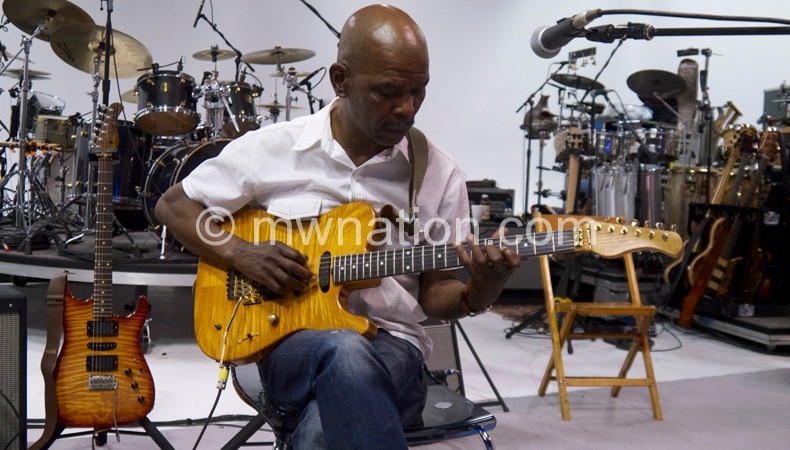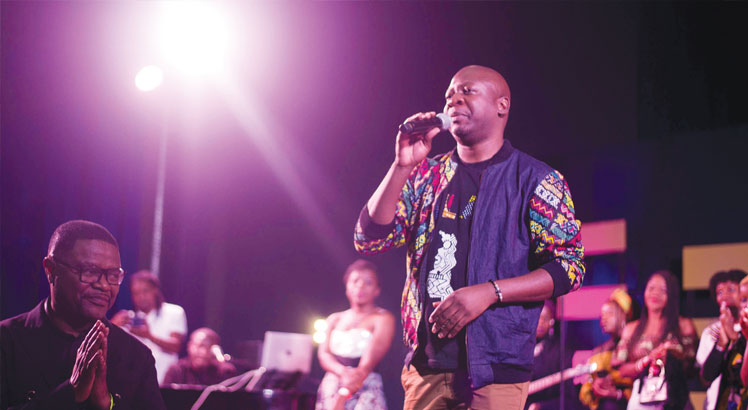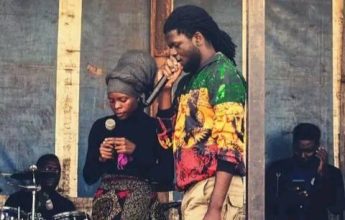The Legend: Ray Phiri, the African jazz master
In 1972, on March 23, in Mpumalanga formerly Eastern Transvaal, South Africa a baby boy was born. That little man was later named Raymond who was to be a legendary guitarist.
Growing up in the streets of Nelspruit mining compound in Hermansberg, after the death of his father, the mother married Justnow Kanyama Phiri, a Malawian troubadour.

The adoptive father played a very big role in his life and today, he is South African award winning legend, Ray Phiri.
It has been indeed a long trip for Ray, who used to dance to his father’s puppet shows. He had his first break when he, in 1962, managed to dance for the legendary Dark City Sisters when they performed in Mpumalanga. He made enough money giving him to travel to Johannesburg, where he formed a soul band, The Cannibals.
When that group ended, he went on to launch Stimela, a hugely successful fusion outfit which released several gold and platinum winning albums like Fire, Passion and Ecstacy, Look, Listen and Decide as well as the controversial People Don’t Talk So Let’s Talk.
Other than producing, playing, arranging and fronting Stimela as well as other artists, in the 1990s appeared on American singer and musician Paul Simon’s Graceland album and subsequent tours.
That is a brief but detailed story of Ray, who says he has different tiers to his personality.
“I believe, like many people, I have many layers to my character. I am a simple man who loves life, music, the arts and people. I am a proud father and grandfather. I am a patriot and an advocate of artists and their rights. I am spiritual in my own unassuming way. I am a musician and a writer. I can be philosophical, but I don’t live with my head in the clouds or in the sand,” he told Chill in an exclusive interview.
Talking about his Malawian connection, the musician speaks highly of his adoptive father.
“Actually both my biological parents are South African. However, I owe a great deal to a Malawian named Justnow Kanyama Phiri from the Dedza region. He came into my life at a time when my mother and I were struggling. He married my mother and took me in as his own son. He was a good father and passed his love of music and entertainment on to me.
“I took on his surname as an act of love and devotion to the man who made me what I am. I wrote a song called “Father” dedicated to him. I regret that he did not see me perform. I am very keen to explore his background in Malawi. I admire the way he carried his Malawian born charm and love for life with him through some harsh times as an immigrant worker,” says Ray.
The legend recalls the puppet stretches his father used to have brought him closer to music and have made him what he is today.
“My adoptive father was a musician and a puppeteer. He used to entertain the other workers on the farm he worked on, as well as visitors to the area. I was attracted to his guitar. He had an almost effortless, charismatic way of playing and he used a device attached to the guitar to make puppets dance in synch to the rhythm. It was hilarious! I started off mimicking these puppet dances, then graduated to learning the guitar.
“Like Tito Jackson, of the Jackson 5, I used to sneak into my father’s bedroom to play his guitar when he was at work. Just like Tito, my secret was out when I broke a string. However, unlike Tito, I was not punished for it. My father actually sat me down and taught me to play rhythms, licks, solo parts and basic scales. When lost the use of his hand, die to an accident, he gave me the guitar. This was the beginning of my career as a guitarist,” he recalls.
Although he was a performer from a young age, Ray says he was a professional musician from the age of 20, when he left home to take chances with the bright lights of Johannesburg.
“I started off as a dancer then musician in 1967 with The Dark City Sisters. In 1969, I joined The Jabavu Queens, which became The Cannibals in 1970. 1980 was the formation of Stimela. I was with the Paul Simon Tour Band 1985-1995 while still a part of Stimela; which was basically the rhythm section of Paul Simon’s band, and still continue with them to this day,” he recollects.
To date, Ray has three solo albums and 13 with Stimela. He has played at different events and is proud of his contributions on three of Paul Simon’s albums including Graceland.
His highlight remains being a father.
“All my children are unique and are finding their own paths in life. I am so proud of that and I am so much in love with them. I feel blessed. Many parents do their best, but lose their children to other influences.
“Being a travelling musician is not easy, as sometimes you are not always there to do the day-to-day things for your family. I thank my wife for her support in raising these special children. As much as I love my music, starting a family is the greatest responsibility I have ever undertaken, and my children are my greatest achievement as man.”
Just like any career, music has its own ups and downs, it is the same with Ray who has encountered challenges all the way to the top. “You mean apart from dealing with crooked, conniving, dangerous people?” he laughs before getting more serious:
“Being an artist is challenging from the perspective of being a person who is rooted in belief, but is living in a world of change and cynicism. You have an idea, a melody, or perhaps a few lines in your mind that you somehow develop into a song. You don’t know at that point whether it will be a hit or not,” he noted.
Along his path of greatness Bra Ray, as he is fondly called in South Africa, has shared his knowledge with up-and-coming artists. During he just ended Season 10 of Idols South Africa, Ray was of the weekly mentors.
He has worked with great artists across the globe apart from Paul Simon. The long list includes Hugh Masekela, Miriam Makeba, Mory Kante, Laurie Anderson, Beatenberg, Oliver Mtukudzi, Phil Manzanera, Willy Nelson, Eric Clapton, Spikiri and Professor.
The artist will, for the first time, perform in Malawi today in a tour that will also see him finding more about Malawian roots.
“Although I am not a native Malawian, my adoptive father Justnow Phiri became my father and changed my life. Thus, I feel a connection to Malawi and want to find out more about his roots. You will hear more about this at the appropriate time,” he mused.
When all is said and done, Ray wants to be remembered “as a student of life. Life is a great university and you never stop learning,” he summed it up.





